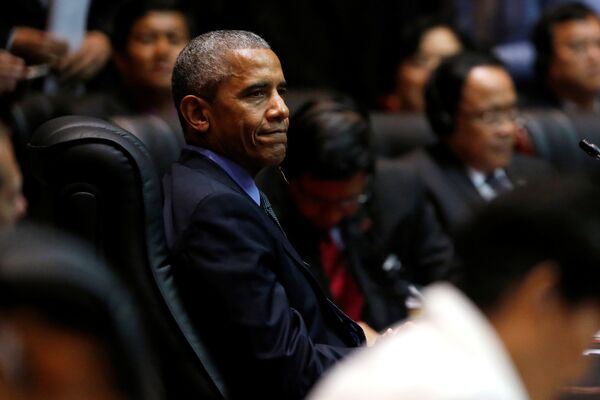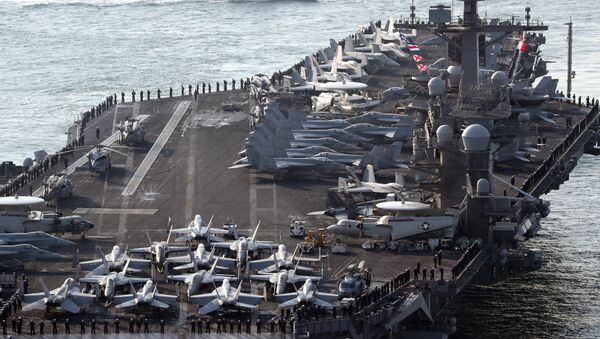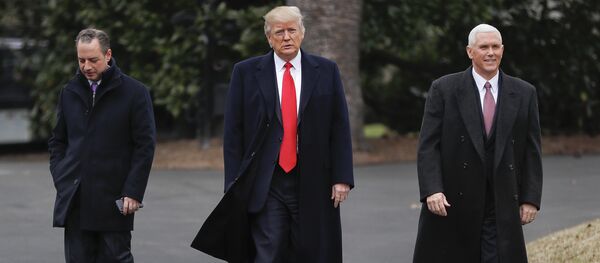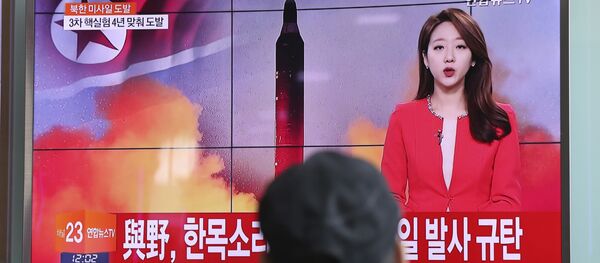Needless to say, the recent developments have triggered deep concern in China, viewed by Washington as the US' economic competitor and a geopolitical rival in the region.
"Sending the aircraft carrier USS Carl Vinson and its escorts into the South China Sea is an apparent shift from the Obama administration's policies of 'de-escalation' and accommodation towards the People's Republic of China," Grant Newsham, a Senior Research Fellow at the Japan Forum for Strategic Studies, remarked in his article for The National Interest.
However, it appears that Newsham may very well be mistaken: ex-President Barack Obama's much discussed Pivot to Asia policy and Trans-Pacific Partnership (TPP) have never been aimed at "de-escalation" and "accommodation" toward Beijing.
Hillary Clinton's 'Pacific Century'
Speaking to Sputnik, founder of "Show Up! America" Jan R. Weinberg referred to Hillary Clinton's America's Pacific Century article for Foreign Policy magazine.
"One of the most important tasks of American statecraft over the next decade will therefore be to lock in a substantially increased investment — diplomatic, economic, strategic, and otherwise — in the Asia-Pacific region. The Asia-Pacific has become a key driver of global politics," then Secretary of State Clinton wrote in October 2011.
Still, Hillary Clinton failed to mention that Obama's Pivot to Asia actually meant an extensive militarization of the region with the TPP project as the spearhead of this policy.
How did it all begin?
How US Defense Lobbyists Found Their Way to White House
"I'm in this race to tell the lobbyists in Washington that their days of setting the agenda are over. They, they have not funded my campaign, they will not work in my White House," then presidential candidate Barack Obama claimed back in 2007.
However, it turned out later that the statement was "nothing less than sheer hypocrisy," Weinberg stressed.
"For example, President Obama, very early in his administration, gave the 'Revolving Door' a spin by nominating William J. Lynn, III, to serve as the United States Deputy Secretary of Defense, knowing full well of Mr. Lynn's position as a lobbyist with Raytheon, a prestigious US defense contractor," he said.
But that is not all.
"Obama opened the door to defense contractor CEOs by including them on the President's Export Council and the President's Council on Jobs & Competitiveness, while they also served on the professional association known as the Business Roundtable, which is a very influential lobbying organization in its own right," Weinberg told Sputnik.
"The Roundtable, which is now comprised of 192 CEOs, is one of the most prominent lobbying groups in Washington, D.C. In 2015, the group spent $19.3 million on lobbying, making it the eighth-biggest spender that year," Fortune reported in December 2016.
One would be apparently surprised to know that Boeing CEO James McNerney, the Business Roundtable Chairman, served at the same time as a member of the President's Export Council, whose main purpose was to advise on trade agreements, under Obama.
Likewise, the other two BR representatives, Lockheed Martin CEO Marillyn Hewson and General Electric CEO Jeffrey Immelt, served as members of the President's Export Council and Council on Jobs & Competitiveness, respectively.

Why US Military-Industrial Complex Pushed Ahead With TPP
There is yet another thing that united them: it's their strong interest in the implementation of the TPP project and Trade Promotion Authority (also known as Fast Track) reauthorization, Weinberg pointed out.
The Fast Track authority expanded the President's powers to negotiate the trade deals; yet by the same stroke diminishing the powers of Congress as described by the Constitution.
"The Business Roundtable had been vociferously involved with promulgating information about the Trade Promotion Authority (TPA) and the Trans-Pacific Partnership (TPP) based on their corporate member's interests, notably through their initiative Trade Benefits America Coalition and other extensive lobbying efforts," Weinberg revealed.
Curiously enough, US media coverage has been void of the Business Roundtable, their Trade Benefits America Coalition and their relationship with TPP, he highlighted.
"Perhaps it has become the new-normal, though little noticed by the American public — by design the defense contractors and ex-military-turned-lobbyists reached the top echelons within the Obama administration, both as advisors on international trade agreements such as the TPP, as well as serving, for example, within the Department of Defense," Weinberg remarked.
The answer is on the surface, according to Weinberg: Obama's Pivot to Asia plan envisaged bolstering weapons deployment to many Asia-Pacific nations and the US military-industrial complex was expecting to benefit from it.
"Defense investment across Asia is expected to continue to grow strongly over the next decade, as sovereign nations seek to modernize defense capabilities in the face of increasing regional threats," Hewson said at the 2016 Lockheed Martin Media Day on March 15, 2016, citing "China's aggressive military build-up and maritime claims, and North Korea's increasingly unpredictable actions."
"Once approved, the Trans-Pacific Partnership agreement will be a cornerstone of US economic policy in the region, and is expected to increase economic ties and the region's importance in years to come," she stressed.
Hillary Clinton's Emails Still Spark Questions
In his previous interview with Sputnik, Weinberg shed light on the Clinton Foundation's cooperation with the US omnipotent military-industrial complex. At the same time, Hillary Clinton, a longstanding "Pivot to Asia" propagator, worked hand in hand with major US defense contractors.
"Through Obama's President's Export Council assignments, James McNerney of Boeing and Marillyn Hewson of Lockheed Martin (both defense contractors) gained unfettered access to President Obama, Secretary of State Hillary Clinton, Secretary of Defense Ashton Carter and Michael Froman the United States Trade Representative. Collectively they all promoted the TPP as an essential component of Obama's overarching foreign policy initiatives known as the Pivot to Asia of which armament sales and the forward deployment of US military assets, as they professed, were an essential part of the US and allied Asia-Pacific nations 'National Security Interests'," Weinberg explained, speaking to Sputnik Wednesday.
One would think that the ongoing "tit-for-tat" arms escalations throughout the entire Indo-Asia-Pacific region would serve as a cataclysmic warning, he believes.
"In my opinion, despite unequivocal admonishments from China and North Korea, the expanded military cooperation agreement with Indonesia, the present deployment of the THAAD missile battery to South Korea, the most recent $1.83 billion of arms sales to Taiwan, Japan's Prime Minister Shinzo Abe's push to "reinterpret" Article 9 of the Japanese constitution which previously prohibited offensive military engagement, the lifting of the US arms embargo against Vietnam, and the expansion of US military bases in the Philippines, were all preplanned militarization aspects of the Obama administration's Pivot to Asia which from the point of view of the defense contractors serves their business interests perfectly well," Weinberg told Sputnik.
As the founder of "Show Up! America" noted in his February interview, Clinton's emails recently obtained by the FBI, as well as those which apparently remain stored in Boeing and GE's data centers, could have apparently raised the alarm and drawn public attention to this problem.
Now he expresses growing concerns that the truth may never find its way out.
Trump and Obama's Legacy: Here We Go Again
He called attention to the fact that the State Department lawyers have recently dismissed conservative watchdog Judicial Watch's request to disclose the rest of Clinton's emails.
Meanwhile, influential defense contractors have again filled the new administration's councils and got positions in the government's departments.
"I doubt that Boeing or GE will ever turn the emails over even if there are court ordered subpoenas compelling them to do so," Weinberg said, "Even if the emails are turned over, at first, only members of Congress and the FBI who have the proper security clearances will be privy to them under the auspices that general knowledge of the contents would be a risk to our national security interests."
Given this, it is highly unlikely that Obama's good old "Pivot to Asia" policy will undergo any significant changes, regardless of the fact that Trump ripped the TPP deal up.
"It is doubtful that the entirety of the present day United States government; President Trump, the Congress, nor the Pentagon will heed the further warnings related to the Arms Race as professed by China. As far as the American public is concerned, in no small part due to their apathy, as a whole they remain in the dark on such issues," Weinberg remarked.
He also warned that the military-industrial complex is pushing the US toward yet another missile crisis, this time in the Asia-Pacific region.
"The American Missile Crisis may very well become the term that historians use to describe the precipitously dangerous, present day, militarization and terrorism issues within the Indo-Asia-Pacific region — should we be fortunate enough, in the unlikely event that we pull back from the brink-of-war," he concluded.
Jan R. Weinberg — American Peace Movement activist and founder of @ShowUpAmerica non-profit organization
The views expressed in this article are solely those of the author and do not necessarily reflect the official position of Sputnik.









